Taobao and WeChat Pay Interoperability Review: Full Support Pending Updates, Is Alibaba More Aggressive Than Tencent?
![]() 09/06 2024
09/06 2024
![]() 480
480
It's no longer news that Taobao and Tmall are set to integrate WeChat Pay. In 2022, Taobao briefly opened a beta test of WeChat Pay to select users. However, yesterday (September 4), the latest news about Taobao's integration with WeChat Pay once again "stirred up the waters."
Firstly, Taobao publicly released a "Consultation on Adding WeChat Pay Capability to Taobao.com," outlining plans to fully integrate WeChat Pay by the end of the month, followed by Tmall's announcement of a similar consultation. Meanwhile, WeChat confirmed that functional compatibility with Taobao merchants is underway, and users should refer to Taobao's platform announcements for specific launch dates.
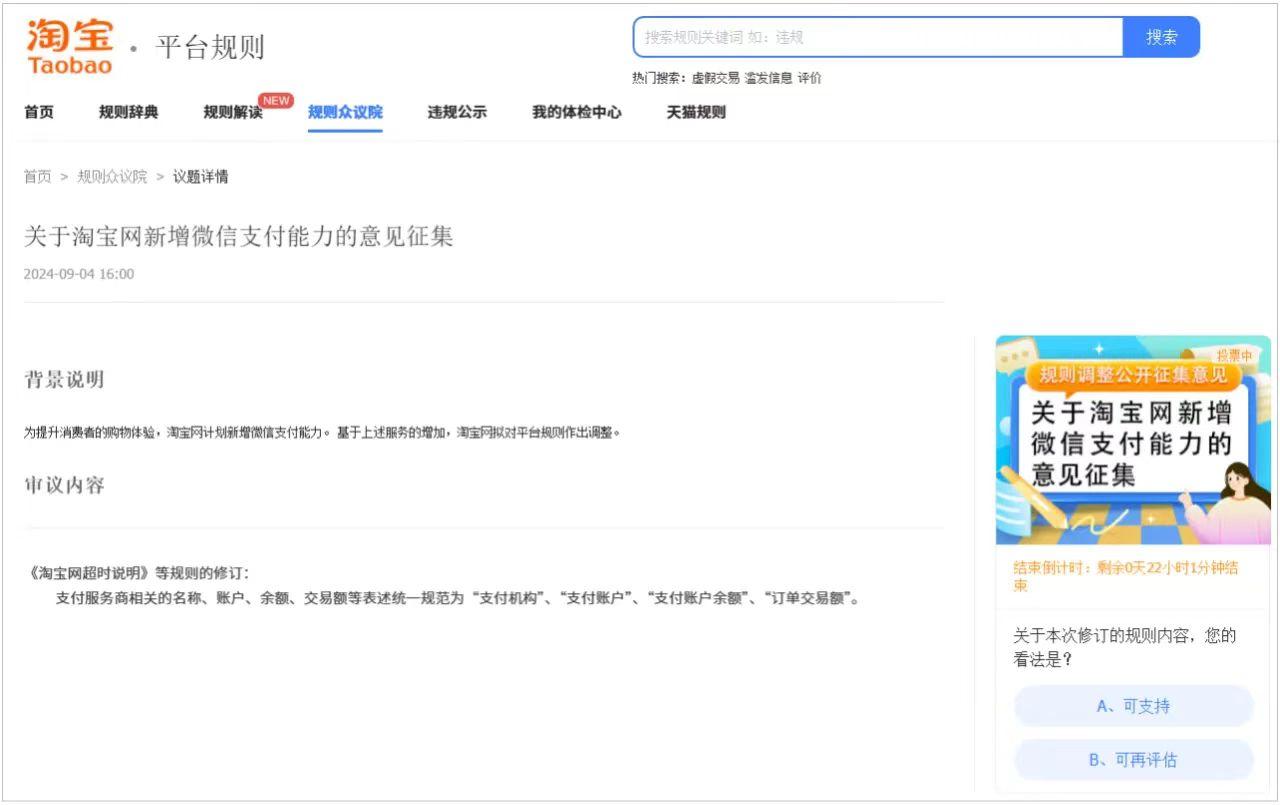
Photo/Taobao
In other words, barring any unforeseen circumstances, we should witness a historic change by the end of September—the ability to freely use either Alipay or WeChat Pay within the Taobao app.
News of Taobao's full support for WeChat Pay quickly spread across Chinese internet platforms. Media and netizens' attention is understandable, as Taobao and WeChat, two of China's most influential apps, have become integral parts of modern Chinese life, with every move affecting our daily routines.
Starting with the mutual blocking between WeChat and Taobao, China's internet landscape saw a period of rivalry between Tencent and Alibaba, until signs of detente emerged in 2021.
Since then, both parties have gradually let go of past grievances. Apps under Alibaba, such as Ele.me, Youku, Damai, Kaola, and Shuqi, have integrated WeChat Pay and launched WeChat mini-programs. Meanwhile, WeChat no longer blocks links to Taobao.
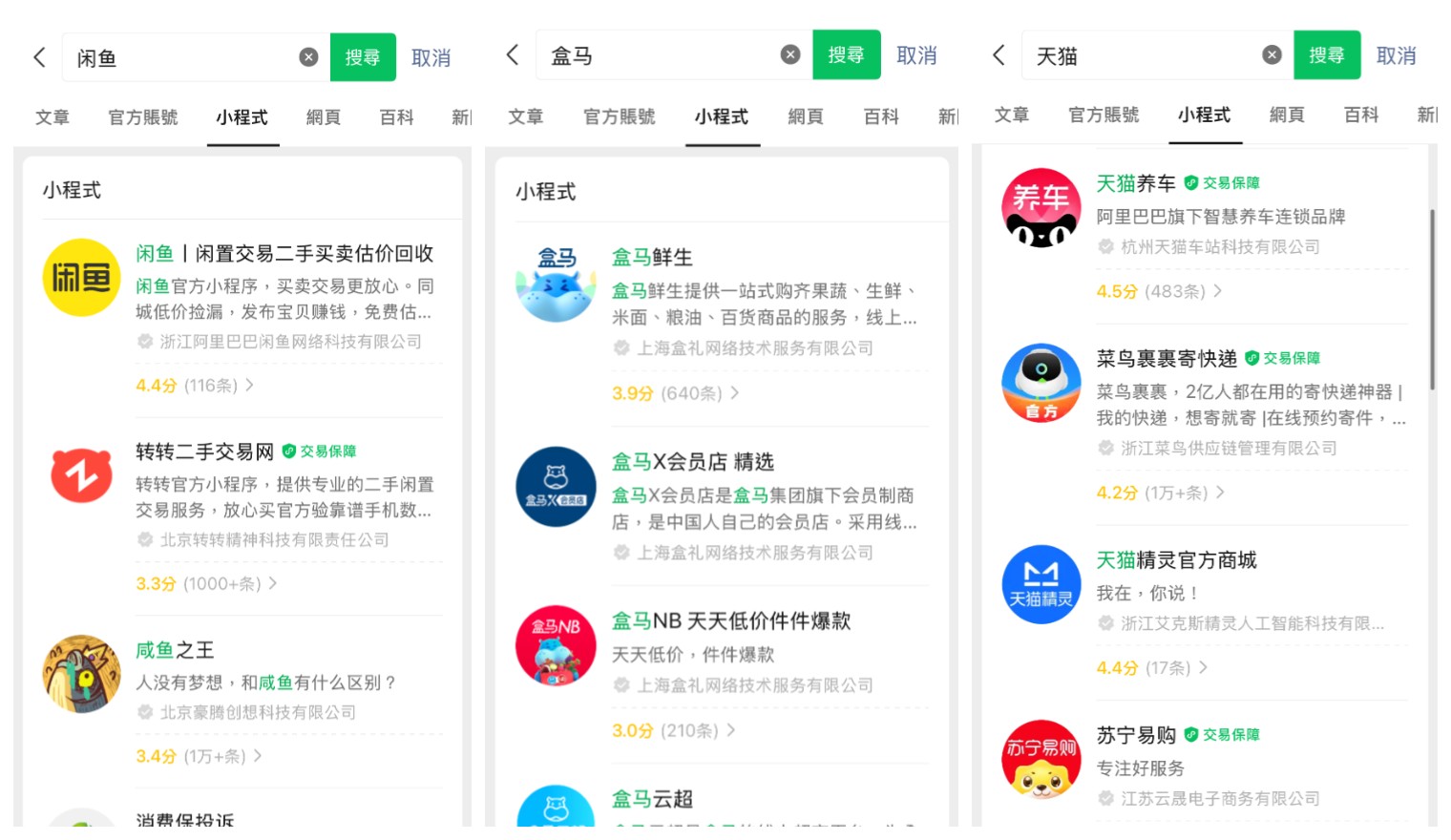
Photo/Leitech
Despite the relatively slow progress in interconnection, advancements continue. In early 2022, Taobao tested "WeChat QR code payment" and "Ask a friend on WeChat to pay for me."
This trend has persisted throughout 2024. Not only have mini-programs like Xianyu appeared on WeChat, but DingTalk announced early this year that users can join DingTalk meetings directly through WeChat without downloading the DingTalk client. It's only a matter of time before Taobao supports WeChat Pay.
Despite this, Taobao's full integration of WeChat Pay remains a landmark event for Alibaba, Tencent, and China's internet landscape. But where do Alibaba and Tencent stand in their interconnectivity journey today?
Payments, Mini-programs, Links... Three Years After Alibaba and Tencent's "Interconnection"
It's worth noting that while the Taobao app has yet to integrate WeChat Pay, Taobao Lite (formerly known as "Taote") already supports WeChat Pay. During testing, we found that products in the personal shopping cart on Taobao Lite can be paid for via WeChat Pay, though full support awaits official confirmation.
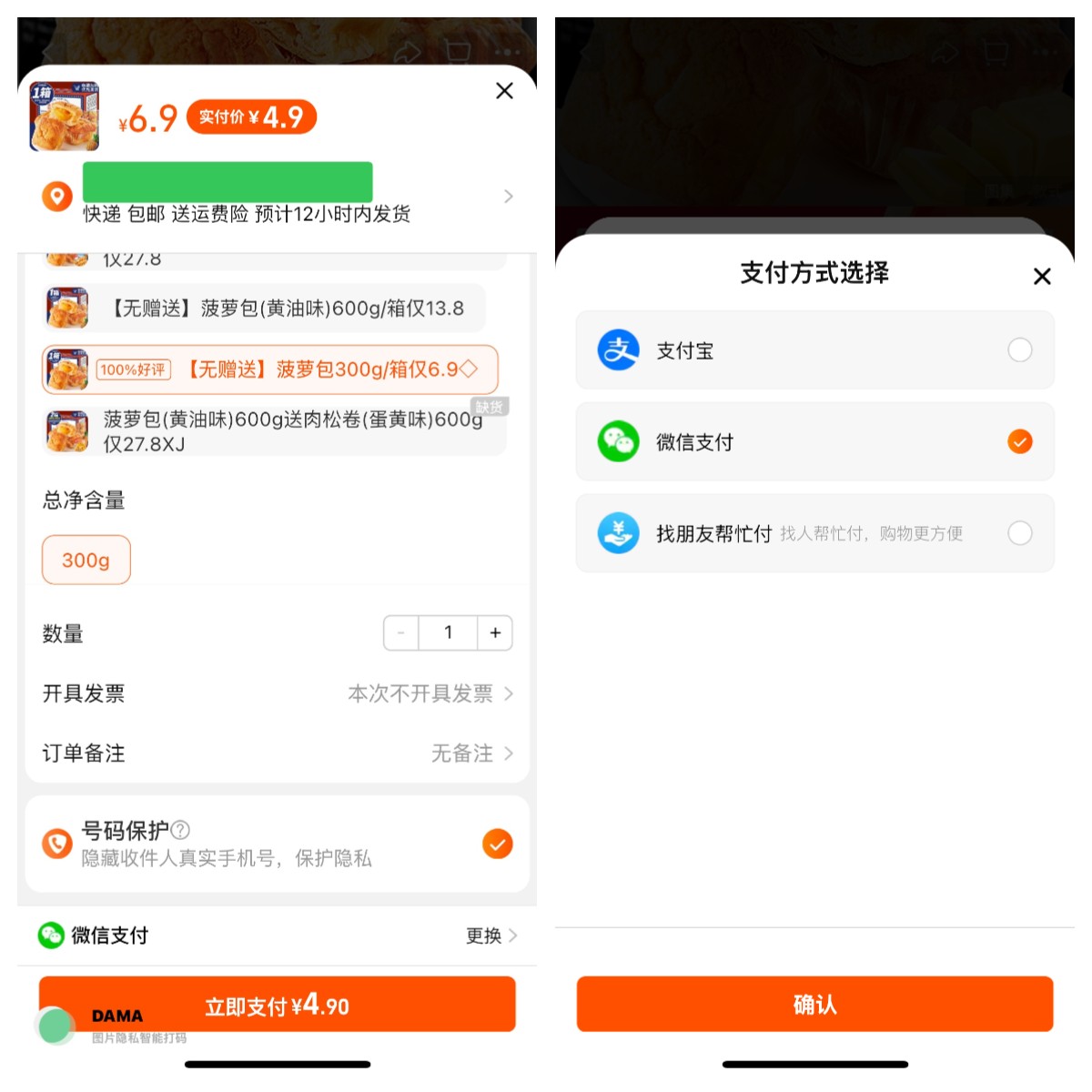
Taobao Lite, Photo/Leitech
Since Taobao Lite and Taobao share the same shopping cart, it could be argued that Taobao indirectly supports WeChat Pay. However, Taobao's website still doesn't support WeChat QR code payment, and it remains unclear if this feature will be available by the end of September.
Moreover, since 2021, Alipay and WeChat Pay have been moving towards "two-way interconnection," particularly facilitated by UnionPay Cloud QuickPass, the "mediator" of the national team. Currently, UnionPay Cloud QuickPass is interconnected with platforms like Alipay and WeChat Pay. In June this year, WeChat Pay and UnionPay Cloud QuickPass announced full-scenario "interconnection."
On the same day Taobao announced its full integration with WeChat Pay, two core Meituan businesses—Meituan Food Delivery and Meituan Hotels—joined Alipay's mini-program ecosystem, while Meituan Group Buying is still in beta testing. Considering Ele.me's early integration into WeChat mini-programs and support for WeChat Pay, users can finally enjoy "payment freedom" when ordering food delivery.
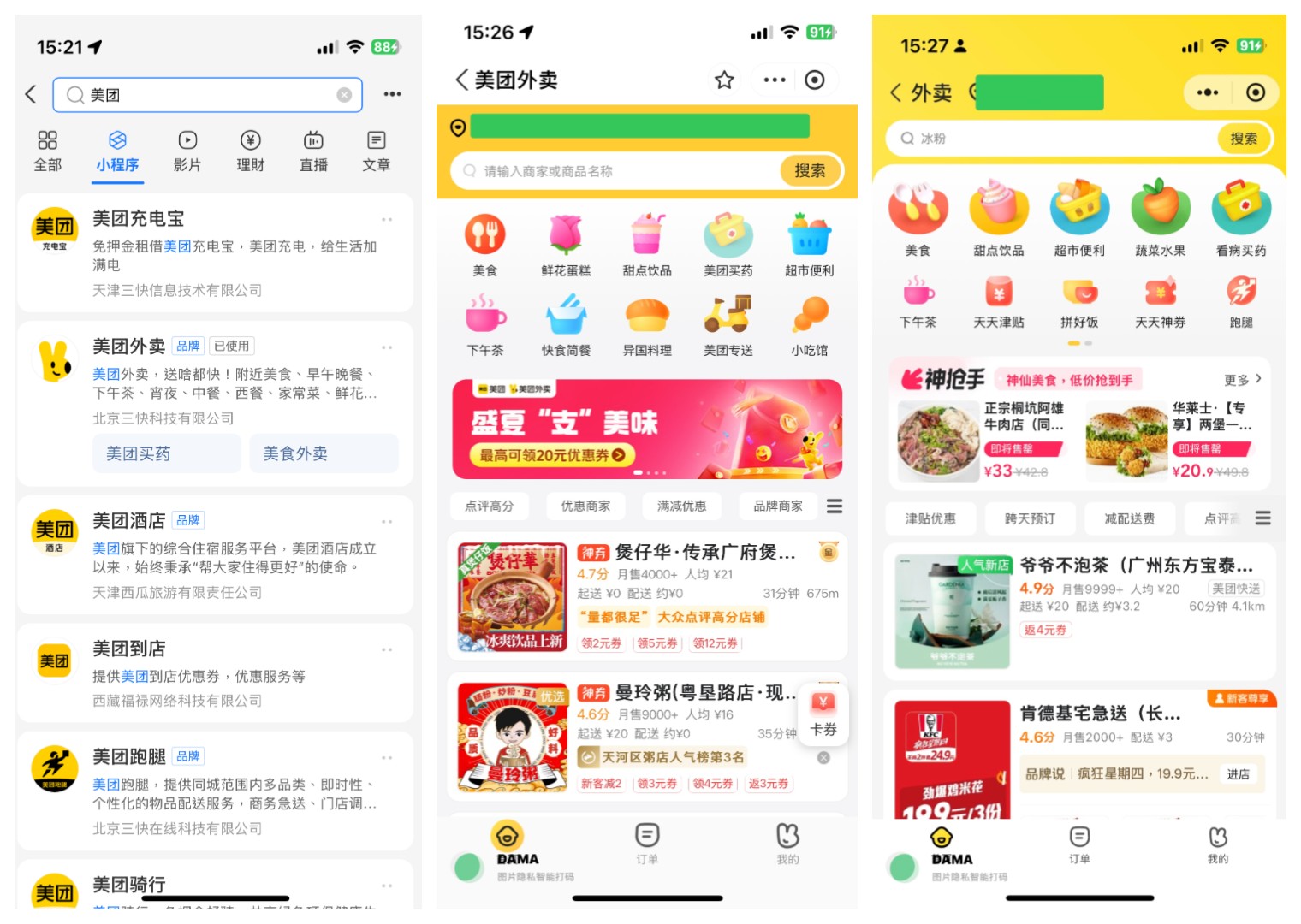
Meituan Food Delivery's WeChat mini-program (second from right) and Alipay mini-program (third from right), Photo/Leitech
We briefly tested Meituan Food Delivery's Alipay mini-program and found a Meituan Food Delivery exclusive coupon worth 2.85 yuan (usable with a minimum spend of 10 yuan). Core functionalities are present, though the interface is more basic compared to the WeChat mini-program version. However, as a first iteration, this is understandable.
Compared to Tencent, Alibaba has been more proactive in launching WeChat mini-programs, including Youku, Damai, Kaola, Taopiaopiao, Ele.me, Fliggy, Cainiao, AutoNavi, and Xianyu. Alibaba even briefly launched a "Tmall Excellence" WeChat mini-program, which was soon removed.
Notably, Alibaba's Hema Supermarket is also available on WeChat mini-programs. However, based on our offline experience and media reports, only Outlets stores support both Alipay and WeChat Pay, while other stores do not support WeChat Pay.
Apart from payments and mini-programs, "links" represent another significant breakthrough.
As is well known, the direct cause of the mutual blocking between Tencent and Alibaba stems from the 2013 conflict between Taobao and WeChat: Taobao cut off data interfaces with WeChat, banning WeChat QR codes and even the words "WeChat." Meanwhile, WeChat blocked Taobao links, preventing users from accessing Taobao within WeChat.
However, eight years after the blocking, WeChat finally lifted the link ban in 2021. Although copied links still display as garbled text, users can now access Taobao links within WeChat. Additionally, the word "WeChat" is no longer a prohibited term on Taobao.
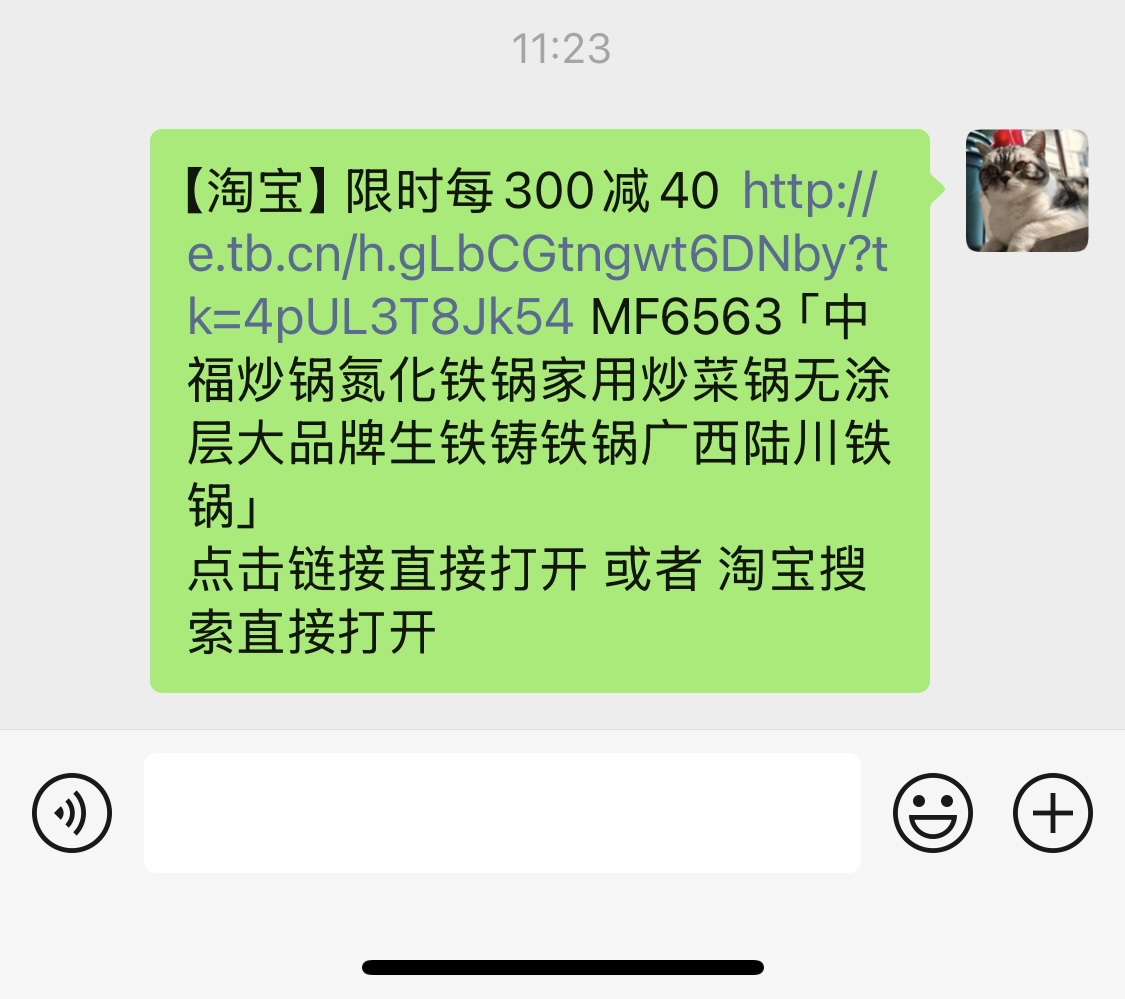
No more garbled text, Photo/Leitech
Since then, progress has been gradual, and users can now send normal Taobao links and captions within WeChat, which can be clicked to open the Taobao app. Still, compared to Pinduoduo and JD.com, which allow sharing products as mini-programs within chats, there's room for improvement in the Taobao-WeChat experience.
Moreover, ahead of last year's Singles' Day, Alimama, Alibaba's digital marketing arm, announced a partnership with Tencent Advertising. Tencent's video numbers, Moments, and mini-programs will open up to Taobao and Tmall, allowing direct jumps through Alimama's advertising placements.
In other words, Tencent's core WeChat platform can finally direct traffic to Alibaba's core e-commerce platforms, Taobao and Tmall. Prior to this, Tencent Video, Tencent News, QQ, and WeChat Official Accounts had already achieved direct jumps to Taobao and Tmall.
While interconnectivity between Alibaba and Tencent hasn't progressed rapidly in their core territories, it's clear that interconnectivity between the two is inevitable.
A More Open Chinese Internet, More User-Friendly for Everyone
Three years ago, the rivalry between Tencent and Alibaba once again sparked dissatisfaction among the public and regulators. The Ministry of Industry and Information Technology emphasized the need for internet companies to rectify issues like blocking website links. Last week (August 30), the State Administration for Market Regulation announced the completion of Alibaba Group Holding Limited's three-year rectification on its official website.
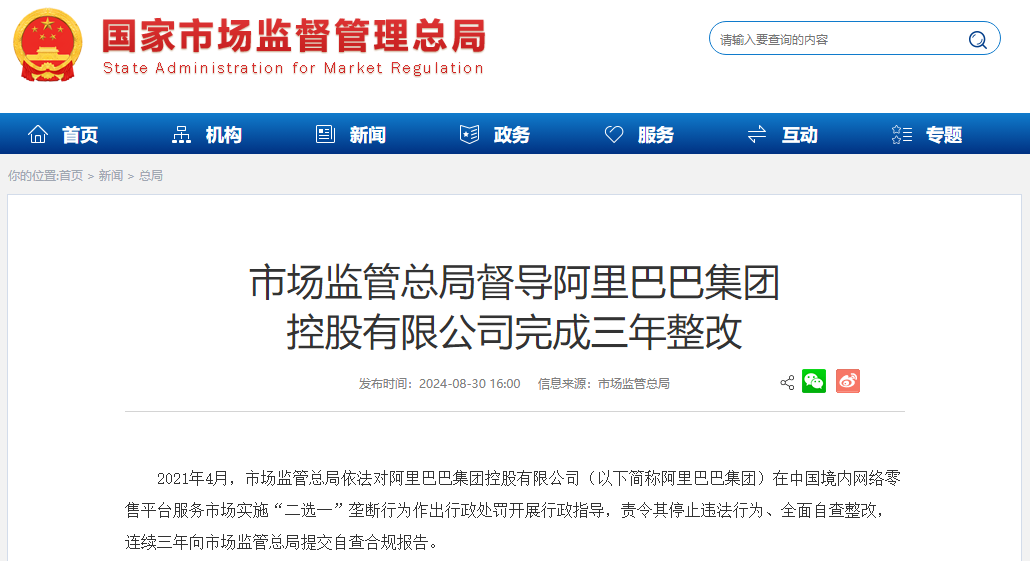
Photo/State Administration for Market Regulation
From 2021 to 2024, Alibaba and Tencent have undergone significant changes. Alibaba Group CEO Daniel Zhang stated upon his appointment last year that Alibaba must become more open and prioritize user experience. Over the past three years, Alibaba has indeed become more open and focused on user experience.
Facing pressure from the e-commerce industry as a whole and competitors like Pinduoduo and Douyin, Alibaba must find more users, orders, and GMV.
Specifically regarding Taobao's integration with WeChat Pay, Tencent's payment product seamlessly entering Alibaba's ecosystem not only offers Taobao users an additional payment option, enhancing their experience, but also considers WeChat Pay's dominant market share in counties and townships, laying a solid foundation for Alibaba to penetrate these markets at the payment level.
For Tencent, supporting Taobao expands WeChat Pay's online e-commerce scenarios, attracting more users and orders, making WeChat an even more versatile super-app in Chinese digital life.
For everyone, Taobao's integration with WeChat Pay signals a shift towards prioritizing and catering to user needs, abandoning the pursuit of closed ecosystems. This means better user experiences and a more open Chinese internet, undoubtedly a positive development from any angle.
This was once unimaginable, but circumstances have changed, and so have users and their environments.
Source: Leitech







